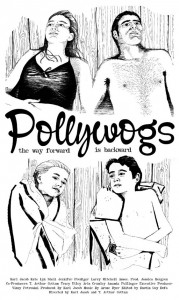
Directors: T. Arthur Cottam, Karl Jacob
MPAA Rating: NR
Film Pulse Score: 6/10
Pollywogs opens in New York City; a phone message plays over scenes of a recently emptied apartment. The main character Dylan (played by writer and director Karl Jacob) lays face down on the hardwood floor, receiving the message’s cold and hard, even if funny, reality. Dylan’s girlfriend has left him, and calls just to list the things she took with her, which seems to be everything they have ever owned. Based on a real message Jacobs once received, the character of Dylan does just as Jacob might have in that situation. Wasting no time he immediately takes to the lakes of Hibbing, Minnesota to nest up his bruised heart amongst family in the middle of a splashy landscape.
This well played impetus sets the stage for a homecoming in the forest of Jacob’s actual home, framed by the company of his real, non-actor family. In these initial shots we see activities that are clearly defined as family time. Whether its tubing, bocce ball, or target practice with rifles and hand guns, everything here is sourced from the director’s natural family life…and it successfully plays as naturalism. One danger here is that the focus is so deeply connected to the culture of upper mid-west states that there is a large part of any audience who may not connect as deeply as a one could and miss the obviously well done mid-western tonality.
Yet tonality is precisely what is so effective about Pollywogs. Performances hone in on accurately portraying Midwest life without pretense. Scenes that show the family cracking jokes, or a metal band playing in the backyard with grandma and grandpa in the meager audience, they reveal a kind of groundedness in the life that allows for a safe and sweet investigation of the cracks in a childhood fantasy. One is swimming, literally, in its landscape. Kate Lyn Sheil (as Sarah) does a powerful job of keeping emotional tension buried beneath the surface in her performance. In fact, a sometimes frustrating but ultimately apropos level of distance in her character suggests the person she is and the fantasy of childhood love story just won’t pair up by the end of the film. That threat is something the audience experiences well before Dylan, and its allows the conflict between dream and reality to sit plainly for all to see. A candid sex scene reveals a greater insight into what is going on in the film…we are not in a narrative that is about the linear nature of specific events, but a film about the space of possibility, fantasy, and the projection of desire onto something, or in this case, someone else.
Perhaps a noticeable flaw is the lack in emotional delivery on behalf of the director himself. He is perhaps preoccupied shooting his first feature (surrounded by his family, utilizing their live’s routine as his setting) that he fails to deliver a strong emotional response to what has happened in the first place in terms of the film’s story, thus never quite establishing the nature of his emotions to begin with. His perpetually broken heart is mentioned in the film, but we don’t see nearly enough of it to believe that he has deeply cared for the person he has lost, or even that he has lost something at all. He may actually just smile too much to give us the impression of intimate injury. The result is that we miss something about his character in the process. We don’t know if we want him to be happy or not, simply because we haven’t really experienced his pain. There is an inevitable immaturity that we pass onto him as a result, but it is not the same as the intended immaturity the director employs.
Having spoken to a very charismatic Karl Jacob after his world premier screening, I found that his nature is very similar to that of the character version of himself he plays. He’s a cheerful guy, ready to give nods to those who have inspired him the most in his still young career. Mike Leigh’s dramatic style was mentioned, and he added that working with Joe Swanberg really inspired him in terms of finding a community of filmmakers to work with, as well as imbuing the nature of working with a particular brand of DIY / just do it mentality. Having written the part of Sarah directly for Sheil, one can see the effect of a larger independent film community at work. Even if Jacob held back a bit in exploring a range of emotions for his character, for every other role he played in this film, he dove in and made a splash.






